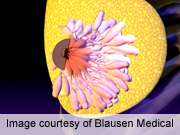For patients with human epidermal growth factor receptor 2-positive early-stage breast cancer, one year of adjuvant trastuzumab should remain the standard of care, according to a study presented at the annual San Antonio Breast Cancer Symposium, held from Dec. 4 to 8.
(HealthDay)—For patients with human epidermal growth factor receptor 2 (HER2)-positive early-stage breast cancer, one year of adjuvant trastuzumab should remain the standard of care, according to a study presented at the annual San Antonio Breast Cancer Symposium, held from Dec. 4 to 8.
Noting that one year of trastuzumab significantly improves disease-free and overall survival, Martine J. Piccart-Gebhart, M.D., Ph.D., from the Jules Bordet Institute at the Université Libre de Bruxelles, and colleagues randomized 5,102 women with HER2-positive early breast cancer from the HERA phase III trial to receive trastuzumab every three weeks for one year or two years, or observation. Participants were randomized following completion of primary therapy: surgery, chemotherapy, or radiotherapy as indicated
The researchers found that, for an event in the two-year versus the one-year arm, the unadjusted hazard ratio was 0.99 (P = 0.86). Between the groups, overall survival was comparable (hazard ratio, 1.05; P = 0.63). The time to distant recurrence and primary cardiac end points (class III or IV heart failure and compromised left ventricular ejection fraction or cardiac death) were comparable between the groups, but the secondary cardiac end point (compromised left ventricular ejection fraction) was elevated in the two-year group. Compared to just observation, the benefit for both disease-free survival and overall survival for both treatment arms remained at eight years of follow-up.
"Giving trastuzumab for a longer duration (two years) did not improve disease-free or overall survival compared with one year of trastuzumab treatment," Piccart said in a statement.
The trial was run by Roche. One author is employed by Hoffmann-La Roche.
More information:
Press Release
More Information
Copyright © 2012 HealthDay. All rights reserved.


















